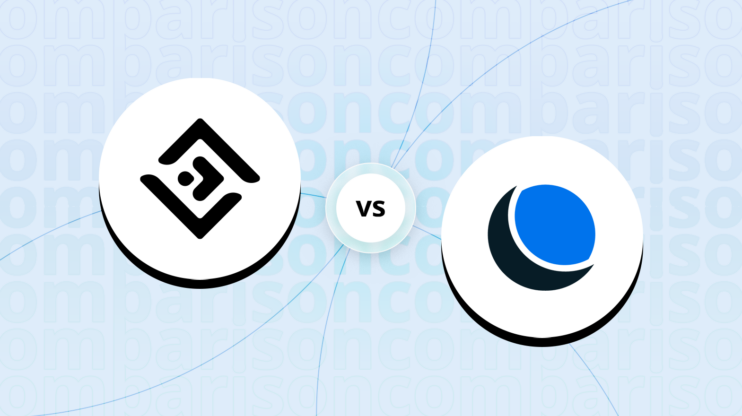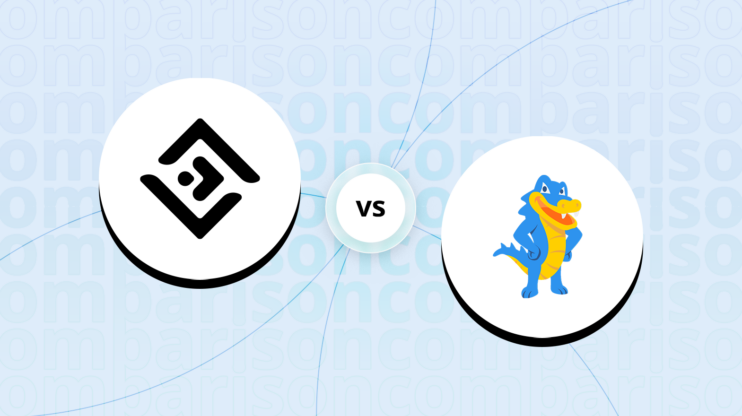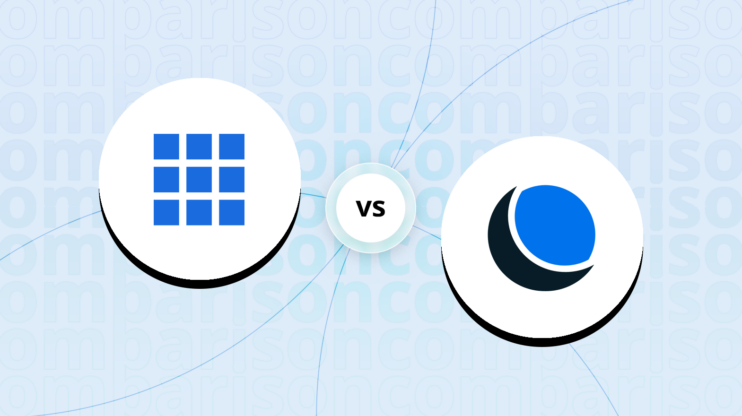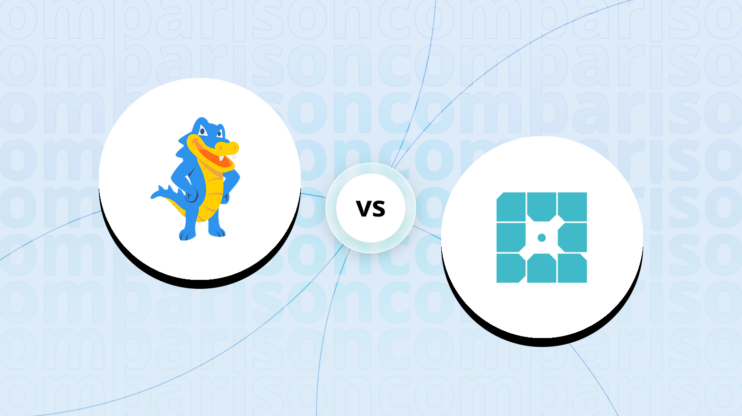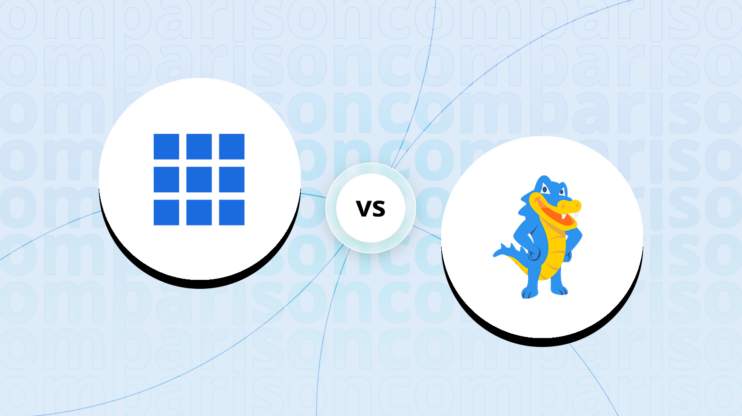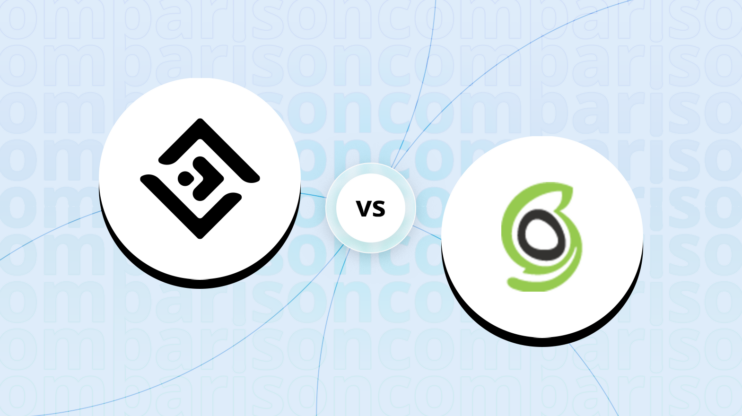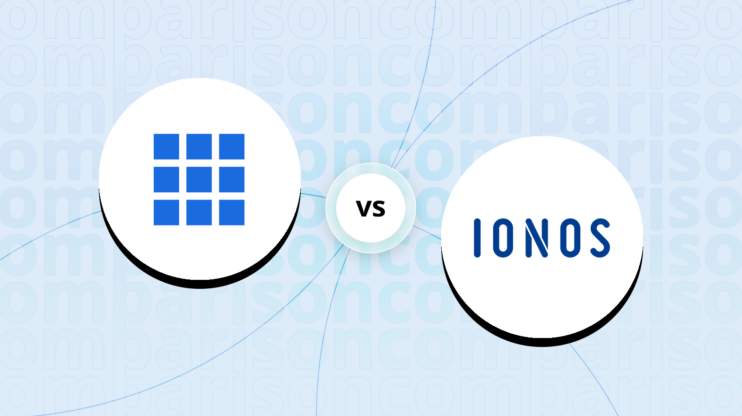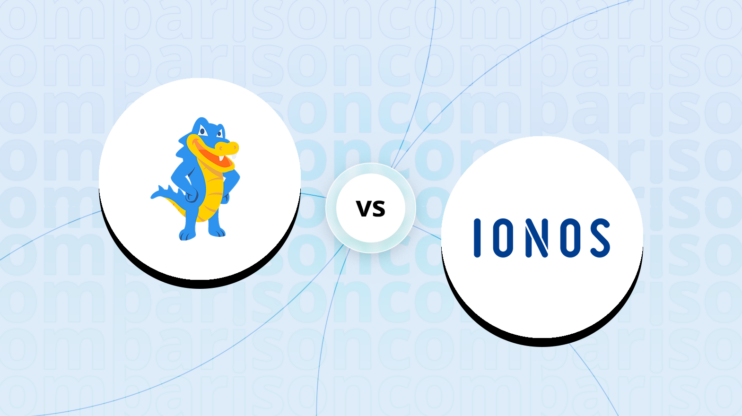Final verdict
Looking over DreamHost vs. HostGator, it’s clear why both hosts are so popular. They have both hosted millions of
websites that run on WordPress for decades, building up a loyal customer base.
-
DreamHost (Overall grade: 8.2)
provides comprehensive options with a strong emphasis on reliability and performance. Its standout features include a 100% uptime guarantee, making it suitable for high-traffic websites and users prioritizing minimal downtime. DreamHost boasts advanced server-level caching and NGINX hosting for efficient handling of large concurrent connections. Free SSL certificates, scalable cloud hosting, and a custom-built control panel enhance the user experience further. However, the absence of phone support and occasional slow customer service response can be a drawback. Its ease of use, combined with extensive knowledge base and advanced features, make it a top choice for users seeking a well-rounded and performance-oriented hosting solution.
HostGator (Overall grade: 8.1)
appeals to beginners and those on a budget, offering affordable and user-friendly web hosting services. Notable strengths include competitive pricing, free SSL, unmetered bandwidth, and accessible customer support options like 24/7 phone support. HostGator also excels in security features, with options like free and paid SSL certificates, SiteLock Security for malware detection, and Cloudflare CDN for DDoS protection. However, areas of improvement include slower server speeds, aggressive upselling tactics, and less robust performance compared to some competitors. It is a practical choice for small-scale or low-traffic sites, but advanced users might find the technical limitations less appealing.
 Overall grade:8.1 |
 Overall grade:8.2 |
|
|---|---|---|
| Uptime and Availability | 7.6 | 8.5 |
| Hosting Performance | 7.7 | 7.8 |
| Hosting Security | 8.6 | 7.8 |
| Price | 8.2 | 8.2 |
| Hosting Features | 7.5 | 7.9 |
| Ease Of Setup | 8.7 | 8.9 |
| User Management | 7.8 | 8.1 |
| Customer Support | 8.6 | 8.3 |
| User feedback | 3.6/5 | 4/5 |
Hosting types offered
Both platforms provide a variety of hosting types, each designed to meet the different needs of users.
 |
 |
|
|---|---|---|
| Shared hosting | ||
| Cloud hosting | ||
| WordPress hosting | ||
| Ecommerce hosting | ||
| VPS hosting | ||
| Dedicated hosting |
Although both offer a variety of hosting plans tailored to different needs, in
certain cases, one platform may prove to be more suitable.
features, making it a better choice for businesses prioritizing long-term growth and stability in their ecommerce endeavors.
Detailed comparison
Uptime and availability
Evaluates the average uptime statistics, uptime guarantee and overall availability of the hosting
provider
Score Components:
- Uptime percentage (30%): evaluates the uptime statistics in given period of time
- Uptime guarantee (20%): Assesses if the platform offers an uptime guarantee and
whether the actual uptime matches the promised guarantee. - General performance (25%): Evaluates how fast is the average response time and overall
it’s stability. - Responsiveness (10%): Adaptability to different devices and screen sizes.
- Availability (25%): Reflects the total downtime and number of outages.
 7.6
7.6
 8.5
8.5
🏆 Winner DreamHost: Reliable performance with a 100% uptime guarantee.
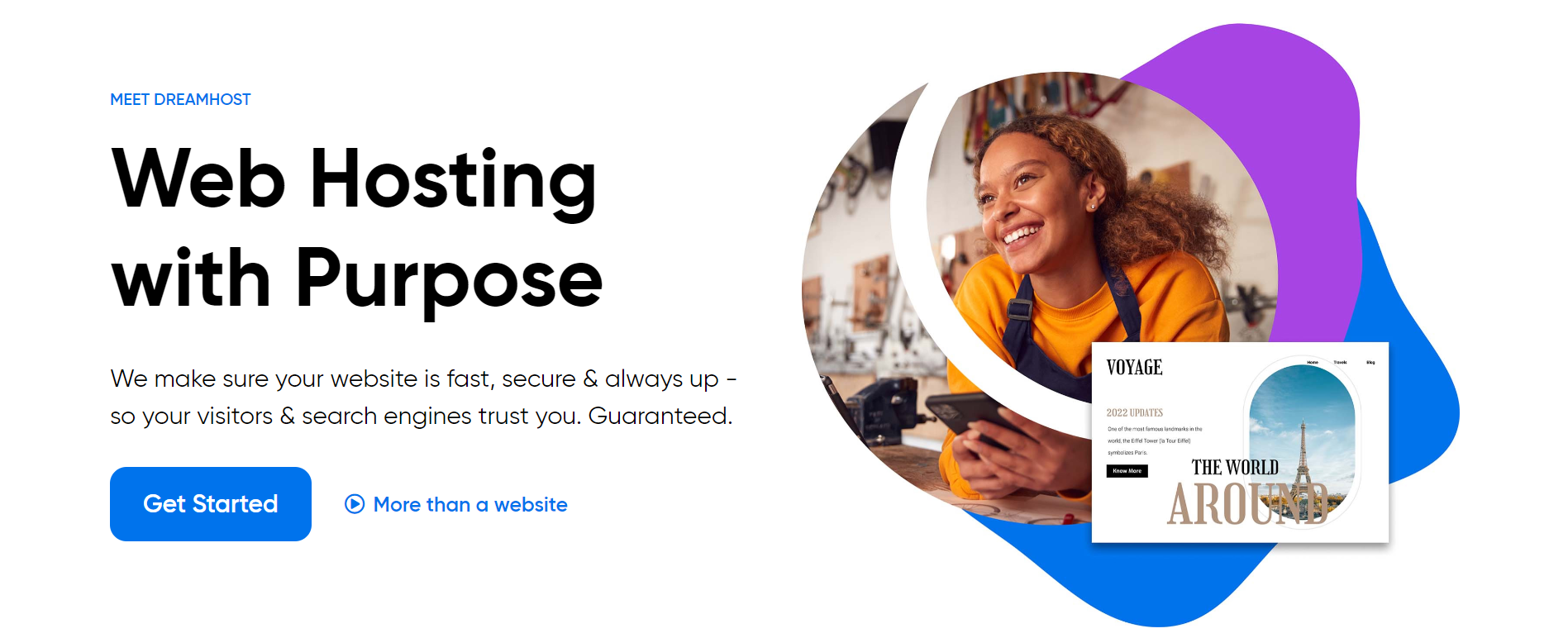
HostGator guarantees 99.9% uptime, translating to around 8.76 hours of downtime per year. They provide 24/7/365 support via telephone or Live Chat, ensuring customer service is always available. However, some competitors offer better uptime guarantees, which means customers might experience slightly less downtime compared to HostGator.
DreamHost, on the other hand, offers a 100% uptime guarantee, and performance testing has consistently shown stable results. DreamHost’s support and fast server response times make it a reliable choice. With a compensation policy for downtime and solid stress test results, their reliability and customer satisfaction are evident.
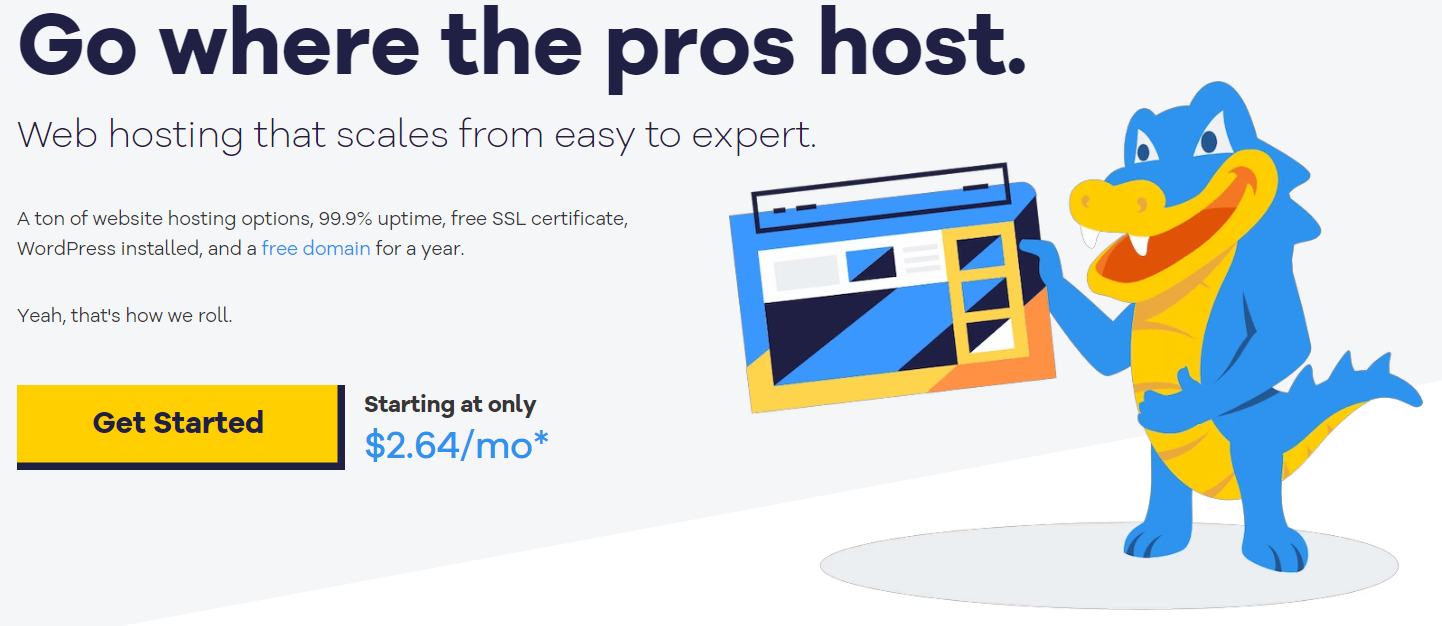
Comparatively, DreamHost provides a stronger value proposition with its 100% uptime guarantee and effective performance metrics. HostGator delivers solid service but falls short when compared to DreamHost’s promise of no downtime and faster, more consistent performance.
Hosting performance
Score Components:
- Hosting speed (30%): This includes SSD quality, Load times, PageSpeed score ranges,
additional information on website speed, built-in plugins for performance enhancement, available caching
methods, and CPU/RAM options - CDN (20%): Considers whether CDN is available or not, whether it’s free or paid, and
the quality of the CDN service - Available data centers (30%): Evaluates the number of data centers and their locations
globally. - Scalibility (20%): Looks at whether elastic scaling is available, the process required
to scale (manual upgrade vs. automatic scaling), the presence of dedicated servers, and the costs
associated with scaling.
 7.7
7.7
 7.8
7.8
🏆 Winner: DreamHost: High-Performance Cloud Hosting for Reliable Uptime and Advanced Features.Between HostGator and DreamHost, the latter edges out with a slight advantage in overall performance. HostGator provides a robust infrastructure with a 99.9% uptime guarantee, unmetered bandwidth, and SSD storage across various plans. HostGator also includes performance enhancements via a Cloudflare CDN and higher vCPU allocations for specific plans. DreamHost, on the other hand, brings high-performance cloud hosting with server-level caching and NGINX hosting, known for handling large concurrent connections efficiently. DreamHost also boasts a 100% uptime guarantee with multiple data centers and RAID 1 storage for enhanced speed and reliability.
Website Speed
HostGator and DreamHost both commit to high-performance speeds, but DreamHost leads with advanced components like SSD storage that claims 200% better performance than traditional drives. HostGator offers Cloudflare CDN to boost page load times, while DreamHost uses built-in server-level caching to enhance speed without extra plugins. DreamHost’s use of NGINX further sets it apart for handling high traffic efficiently, whereas HostGator employs vCPU allocations in some plans for increased performance. Overall, DreamHost’s advanced caching and infrastructure make it the winner in website speed.
Scalability
HostGator and DreamHost provide scalable solutions that can grow with your website. HostGator allows customers to scale resources with various plans, although specific details on automatic scaling aren’t provided. DreamHost offers expandable RAM and storage, allowing for seamless upgrades. Both providers offer dedicated servers, but scaling costs vary by plan, with DreamHost’s VPS hosting starting at $10.00/mo and dedicated hosting at $199.00/mo. Since detailed automatic scaling information isn’t available for either, they both offer flexible scaling but may require plan upgrades as needs grow.
Hosting security
and regulatory requirements
Score Components:
- Technical security measures (40%): This includes encryption, firewalls, DDoS
protection, secure configurations, server monitoring, access control and availability of security addons
(e.g Sitelock security). - Operational security measures (30%): Encompasses data privacy, backups and data
redundancy. - Compliance and certifications (20%): Adherence to legal and regulatory requirements
(e.g., GDPR, HIPAA) and possession of certifications (e.g., ISO 27001, SOC 2). - Business and reliability (10%): Factors in the provider’s reputation, uptime
guarantees, and customer support.
 8.6
8.6
 7.8
7.8
🏆 Winner HostGator: Offering robust security features and compliance measures for a secure hosting experience.
Both HostGator and DreamHost, have notable differences in their approaches to technical and operational
security, as well as in their compliance with regulations.
Technical security measures:
HostGator provides free SSL certificates that encrypt communications with strong 2048-bit signatures and up to 256-bit encryption. It also offers various paid SSL options, including Wildcard SSL and EV SSL, which provide higher protection levels and warranties. DreamHost also provides free SSL certificates through Let’s Encrypt and allows the installation of third-party certificates but does not support Wildcard certificates. HostGator supports PHP 8.2 compared to DreamHost’s support for PHP 8 and includes OPcache for performance. Both hosting providers offer essential technical security measures, but HostGator’s additional SSL options give it an edge.
Operational security measures:
HostGator integrates SiteLock Security for malware detection and removal, Cloudflare CDN for DDoS protection, and automatic backups with CodeGuard. DreamHost provides Multi-Factor Authentication, DreamShield malware scanning, and DDoS protection. Both offer secure remote access options like SSH and SFTP. However, HostGator’s use of SiteLock and Cloudflare for comprehensive malware and DDoS protection stands out.
Compliance and certifications:
Both HostGator and DreamHost are GDPR compliant and take measures to protect EU residents’ data. HostGator has been GDPR compliant since May 25, 2018, and DreamHost applies GDPR regulations to its entire user base globally. HostGator’s PCI compliance covers server-related aspects, while DreamHost ensures its servers support PCI compliance but leaves customer websites to obtain their own certification. DreamHost does not support HIPAA compliance, whereas HostGator does not specify its stance on HIPAA compliance.
 |
 |
|
|---|---|---|
SSL certificate |
Free and paid options |
Free with Let’s Encrypt |
Additional security features |
SiteLock, Cloudflare, CodeGuard |
MFA, DreamShield, .htaccess |
PHP versions |
PHP 8.2 |
PHP 8, OPcache |
GDPR compliance |
Yes |
Yes |
HIPAA compliance |
Not specified |
No |
PCI compliance |
Server aspects covered |
Customer must obtain |
Hosting features
Score Components:
- Domains (20%): Assesses the availability of a free domain, domain purchase options, and
pricing - Email (15%): Considers if the provider offers full email hosting, or is reselling
third-party service, and if the email is only transactional or not - Website builder (15%): Checks if website builder is available, and it’s user
friendliness and overall the level of customization allowed. - Staging environment (20%): Determines if a staging environment is available, allowing
for testing changes before going live. - FTP & SFTP accounts (10%): Evaluates if and how easily users can access FTP and
SFTP accounts - Git and SSH access (20%): Assess whether Git is integrated into the hosting service and
if SSH access is provided
 7.5
7.5
 7.9
7.9
🏆 Winner
DreamHost: A top web hosting choice with robust features that cater to various needs.
Both HostGator and DreamHost offer extensive web hosting features catering to different types of users. HostGator provides a range of plans including Shared, VPS, Dedicated, and WordPress hosting. With advanced features like full Unix shell access, DDOS protection, and support for multiple programming languages, it is well-suited for more technical users. DreamHost, on the other hand, simplifies the process with an emphasis on user-friendliness, offering automated WordPress setup, free domain registration, and a 100% uptime guarantee. DreamHost’s commitment to privacy and open-source solutions, along with unlimited storage and free WHOIS privacy protection, stands as a unique selling point. HostGator’s promotional rates are appealing but are applicable only for the initial term, making it essential for users to consider long-term costs.
When evaluating the availability of website builders, DreamHost integrates instant WordPress setup, appealing to users who prefer seamless site-building with automated setups. HostGator also supports WordPress, but with added advanced customization capabilities that cater to developers wanting granular control over server configurations, including SSH and FTP access. HostGator includes useful tools such as a full cPanel suite and application customization, making it a versatile choice for more tech-savvy users. Meanwhile, DreamHost offers managed WordPress hosting with built-in caching and backup solutions, ensuring less hassle for users focused on maintaining optimal website performance with minimal intervention.
 |
 |
|
|---|---|---|
Free domain |
Yes, for the first year |
Yes, for the first year |
Free SSL |
Yes |
Yes |
Email hosting |
Yes |
Yes |
Website builder |
Yes, WordPress support |
Yes, Instant WordPress setup |
Staging environment |
Partially, in higher plans |
Yes, 1-click staging |
FTP & SFTP accounts |
Yes |
Yes |
Git and SSH access |
Yes |
Yes |
Free backup |
Yes, for the first year |
Yes |
Money back guarantee |
Yes, 30 days |
Yes |
a location.
As a result in rare cases the features mentioned here can differ from the ones you see on their websites.
Email services:
HostGator allows unlimited email accounts and supports various mailing tasks aligned with general business needs, including free content transfers. DreamHost provides flexible email hosting with professional addresses and no additional fees, and it also covers transactional emails fit for different user requirements, including reselling third-party services like Google Workspace. This approach provides adequate support for users needing extensive email capabilities.
Price
Score Components:
- Plan value (40%): What each pricing tier offers.
- Transparency and clarity (30%): Clearness of pricing structures.
- Flexibility of plans (20%): Range of options to suit different budgets.
- Hidden costs (10%): Additional expenses not included in the plan.
 7.4
7.4
 8.2
8.2
🏆 Winner
DreamHost: DreamHost scores slightly higher overall, mainly due to the robust features included in their plans and the transparency of what’s included.
Evaluating the pricing of plans among various hosting providers can be complex due to their differing pricing and renewal strategies. Additionally, certain plans require annual commitments, which adds to the difficulty of making comparisons. The prices listed are based on monthly commitments; plans requiring annual commitments are indicated. Additionally, although some providers offer identical plans for WordPress and shared hosting, we have created separate tables for each to enhance clarity.
When comparing the price plans of HostGator and DreamHost, it is evident that DreamHost offers more cost-effective options, especially for new customers. For shared hosting, DreamHost’s Shared Starter plan starts at $2.59/month, significantly lower than HostGator’s Hatchling Plan at $17.99/month. WordPress hosting is similarly competitive, with DreamHost’s DreamPress plan at $16.95/month, providing a substantial savings over HostGator’s Baby Plan at $21.99/month. Additionally, DreamHost plans feature unlimited storage and automated daily backups, offering more value for the price.
 |
 |
|---|---|
|
Baby Plan $21.99
Up to 2 websites, 20GB storage, unmetered bandwidth, phone and chat support, free domain 1st year, basic email, free SSL, WordPress pre-installed, malware scanning, Cloudflare CDN, 2 vCPUs Value for price:7.0
|
DreamPress $16.95
1 website, 30GB SSD storage, unmetered bandwidth, free domain, built-in caching, automated daily backups, on-demand backups, 24/7 WP support Value for price:8.0
|
|
Business Plan $27.99
Up to 3 websites, 40GB storage, unmetered bandwidth, phone and chat support, free domain 1st year, basic email, free SSL, WordPress pre-installed, malware scanning, Cloudflare CDN, daily backups, domain privacy, 3 vCPUs Value for price:7.5
|
DreamPress Plus $29.95
1 website, 60GB SSD storage, unmetered bandwidth, free domain, built-in caching, automated daily backups, on-demand backups, 24/7 WP support Value for price:7.5
|
|
Pro Plan $34.99
Up to 5 websites, 100GB storage, unmetered bandwidth, phone and chat support, free domain 1st year, basic email, free SSL, WordPress pre-installed, malware scanning, Cloudflare CDN, daily backups, domain privacy, 5 vCPUs Value for price:7.8
|
DreamPress Pro $79.95
1 website, 120GB SSD storage, unmetered bandwidth, free domain, built-in caching, automated daily backups, on-demand backups, 24/7 WP support, priority support Value for price:7.0
|
 |
 |
|---|---|
|
Hatchling Plan $17.99
1 website, 10GB SSD storage, unmetered bandwidth, chat support, free domain 1st year, cPanel Value for price:6.5
|
Shared Starter $2.59
1 website, unlimited storage, free domain, free SSL, automated daily backups, 24/7 support Value for price:8.5
|
|
Baby Plan $21.99
Up to 2 websites, 20GB SSD storage, unmetered bandwidth, phone and chat support, free domain 1st year, cPanel Value for price:6.8
|
Shared Unlimited $3.95
Unlimited websites, unlimited storage, free domain, free SSL, automated daily backups, 24/7 support, email hosting Value for price:8.8
|
|
Business Plan $27.99
Up to 3 websites, 40GB SSD storage, unmetered bandwidth, phone and chat support, free domain 1st year, cPanel Value for price:7.2
|
N/A
|
 |
 |
|---|---|
|
Snappy 2000 $91.99
2GB RAM, 2 cores, 120GB SSD storage, unmetered bandwidth, cPanel & WHM, unlimited websites, billing software, email accounts, MySQL databases, FTP accounts Value for price:6.0
|
DreamCompute (variable pricing)
Scalable cloud computing, root access, SSD storage, fast networking, OpenStack APIs, 24/7 support Value for price:7.5
|
|
Snappy 4000 $131.95
4GB RAM, 2 cores, 165GB SSD storage, unmetered bandwidth, cPanel & WHM, unlimited websites, billing software, email accounts, MySQL databases, FTP accounts Value for price:6.2
|
DreamObjects (variable pricing)
Cloud storage, Amazon S3 compatible, unlimited subdomains, WHOIS privacy, auto-renewals, 24/7 support Value for price:7.8
|
|
Snappy 8000 $161.99
8GB RAM, 4 cores, 240GB SSD storage, unmetered bandwidth, cPanel & WHM, unlimited websites, billing software, email accounts, MySQL databases, FTP accounts Value for price:6.5
|
N/A
|
As a result in rare cases the prices displayed here can differ from the ones you see on their websites.
Enterprise plans
HostGator’s Power Server offers 16GB RAM, 8 cores, and unmetered bandwidth at $121.88/month (intro price). On the other hand, DreamHost’s Enhanced 32 plan provides 32GB RAM, 12 cores, and uncapped bandwidth at $299.00/month. Both options ensure 24/7 support and high storage capacity, but DreamHost includes a 100% uptime guarantee making it a robust choice for enterprise-level applications.
Ease of setup
platform.
Score Components:
- Site migration (25%): Assesses whether the provider offers tools for site migration,
either automated or manual, and whether these services are free or require a fee. - Admin panel usability (35%): Evaluates the type of admin panel provided, such as the
standard cPanel or a custom solution, focusing on its accessibility and user-friendliness for both
technical and non-technical users. - Setup features (20%): Examines the availability and ease of use of various setup
features, including FTP accounts, file managers, email account setup, PHPMyAdmin, and easy CDN
configuration. - Help center quality (20%): Measures the quality and accessibility of the provider’s
help center resources, including articles and tutorials.
 8.7
8.7
 8.9
8.9
🏆 Winner
DreamHost: User-friendly setup process with extensive support resources.
HostGator offers a control panel designed for ease of use, presenting an accessible interface for both technical and non-technical users. It includes various management functions from a single dashboard, integrating features like one-click installs for over 75 open-source scripts. This makes it particularly attractive for beginners who need to set up their site quickly without extensive technical know-how. Additionally, HostGator’s WordPress hosting comes with WordPress pre-installed, easing the setup process further for those looking to use the popular CMS.
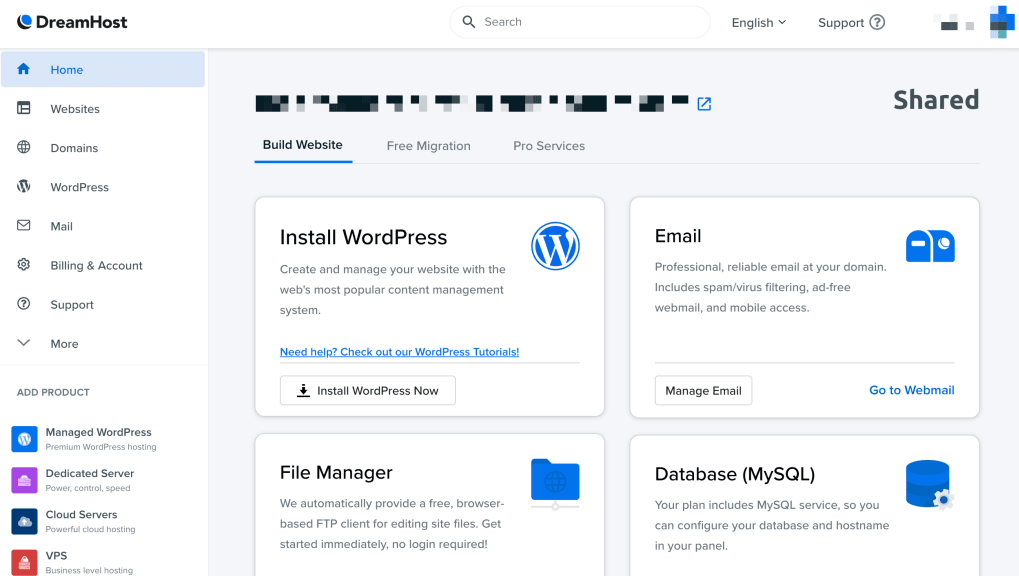
DreamHost, on the other hand, provides a custom-built control panel tailored specifically for easy account administration and advanced features like SFTP and Shell Access. This custom panel is intuitive, offering a streamlined user experience that combines usability with functionality. Particularly for those in need of a more specialized environment, DreamHost’s panel includes extras like WP-CLI for WordPress command-line users. Both hosting providers cater to all levels of expertise, but DreamHost’s custom control panel might be more appealing for those looking for additional advanced options.
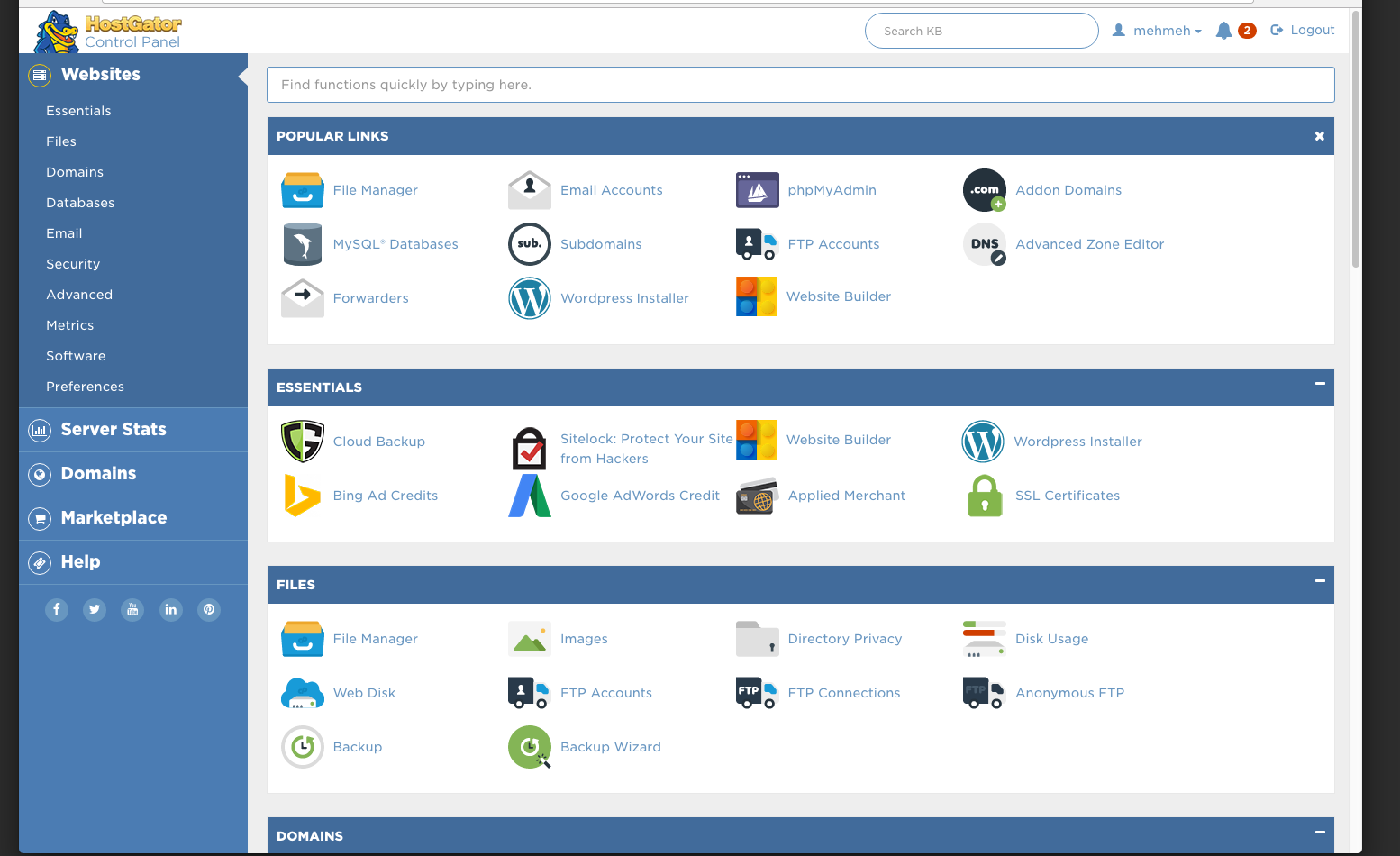
Both providers offer robust migration tools, but DreamHost has an edge with its Migration Dashboard, which scans your site and presents various migration options. HostGator, while also providing free migration services, leans more towards a manual process where their team handles migration for you. Therefore, HostGator’s approach might be better for users who prefer support throughout the migration, whereas DreamHost offers greater self-service flexibility.
The platforms provide extensive knowledge bases filled with guides, how-to articles, and instructional content. HostGator offers a wide range of resources alongside 24/7 chat and phone support. DreamHost also boasts a detailed help center with an intuitive search function and around-the-clock support via live chat, phone, and ticketing, ensuring comprehensive user support.
User management
accessibility.
Score Components:
- Role customization (40%): Flexibility in creating and defining user roles and
permissions. - Ease of management (30%): User interface and tools for managing users.
- Access control (20%): Effectiveness of access control measures for different user
levels. - Scalability (10%): Ability to manage a growing number of users efficiently.
 7.8
7.8
 8.1
8.1
🏆 Winner DreamHost: Best overall for user management and advanced features.
When comparing HostGator and DreamHost in terms of managing user roles, permissions, and accessibility, HostGator offers a structured and categorical approach with three defined user roles: Primary Contact, Administrative Contact, and Technical Contact. These distinctions allow for clear segmentation of responsibilities, ensuring that only the right users have access to sensitive account changes. On the other hand, DreamHost provides a broader variety of user management options, including secure SFTP access and SSH capabilities, which cater to more technical and development-oriented needs but lacks the same granularity in defined user roles. Both platforms facilitate flexible user role creation but differ in their targeted user bases—HostGator is more structured for straightforward role assignment, while DreamHost prioritizes development flexibility.
HostGator’s user interface for managing users is straightforward, accessible through the Customer Portal where Primary Contacts can manage all aspects of user roles. The process of adding or editing users is clear, ensuring ease of use for account holders. DreamHost features a custom-built control panel designed to manage various aspects of the hosting environment, from domains to email accounts, and file management. This interface is user-friendly but may require a steeper learning curve for those unfamiliar with server management.
Regarding access controls, HostGator employs role-based permissions that clearly delineate capacities across different user types, ensuring responsibilities are compartmentalized efficiently. DreamHost, while offering unlimited SFTP and SSH access, excels at providing more technical permissions fitting for users who need advanced control like crontab access and source code management. Both platforms can effectively manage a growing number of users; however, DreamHost’s setup is more comprehensive, offering fine-grained control features which can be advantageous for technical teams working collaboratively.
HostGator user roles table:
| Role | Description | Access highlights |
|---|---|---|
| Primary Contact | Full authority on the account, suitable for primary account holders | Edit account holder, payment info, user roles, purchase products, manage domains |
| Administrative Contact | Limited permissions, ideal for administrative tasks | Edit payment info, manage products, renew services, edit WHOIS Admin/Tech info |
| Technical Contact | Restricted capabilities, focused on product maintenance | Manage products, renew services, edit WHOIS Admin/Tech info |
DreamHost user roles table:
| Role | Description | Access highlights |
|---|---|---|
| SFTP User | Access data securely using SFTP | Secure data access via SFTP, suitable for managing website files |
| SSH User | Secure remote server access | Command-line operations through SSH |
| SVN User | Manage source code files in a collaborative environment | Access to Subversion repository, reduce conflicts in team projects |
| Cron User | Automate command-line tasks using Cron | Schedule tasks, automate processes for efficiency |
| Admin User | Manage domains, mail, FTP, SSH, support, and more through control panel | Full control panel access, manage various aspects of the hosting environment |
Customer support
hosting provider.
Score Components:
- Support communication channels (30%): Measures the variety of customer support types
provided (live chat, chatbot, email, phone, etc.) - Availability (20%): Assesses the availability hours for each channel, including 24/7
support options. - Technical support quality (30%): Assesses whether the provider offers comprehensive
technical support, including hardware upgrades (e.g., HDD to SSD), software installations, and web
server configuration changes. - Enterprise support (20%): Checks if there are dedicated or priority support services
for enterprise-level customers.
 8.6
8.6
 8.3
8.3
🏆 Winner
HostGator: Reliable servers and ease of use for new users make HostGator a standout hosting provider.
 |
 |
|
|---|---|---|
Phone support |
||
Live chat support |
||
Chatbot |
||
Email/ticket support |
||
Enterprise support (dedicated agent, priority support) |
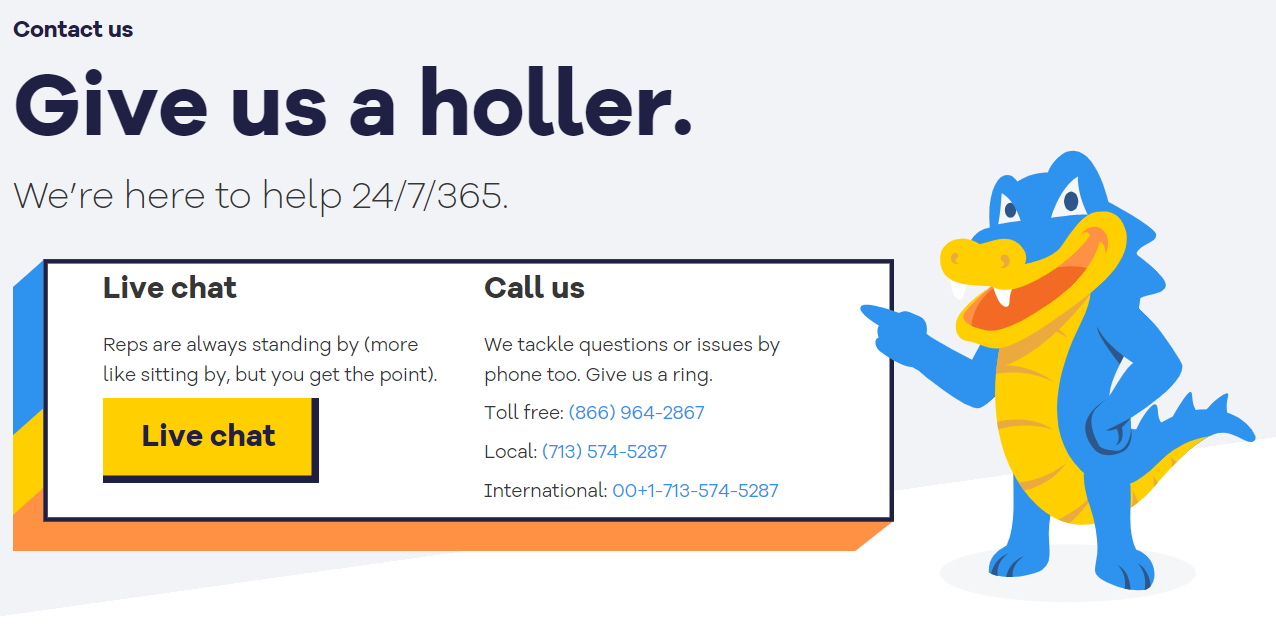
HostGator and DreamHost both offer 24/7/365 customer support, ensuring their clients can get help whenever needed. HostGator provides a broad range of contact methods, including phone support, live chat, and even support via Twitter. DreamHost, while lacking direct phone support, compensates with a comprehensive ticket system, live chat, and email support. HostGator also boasts resources like a KnowledgeBase, webinars, and YouTube tutorials, enhancing its user support experience.
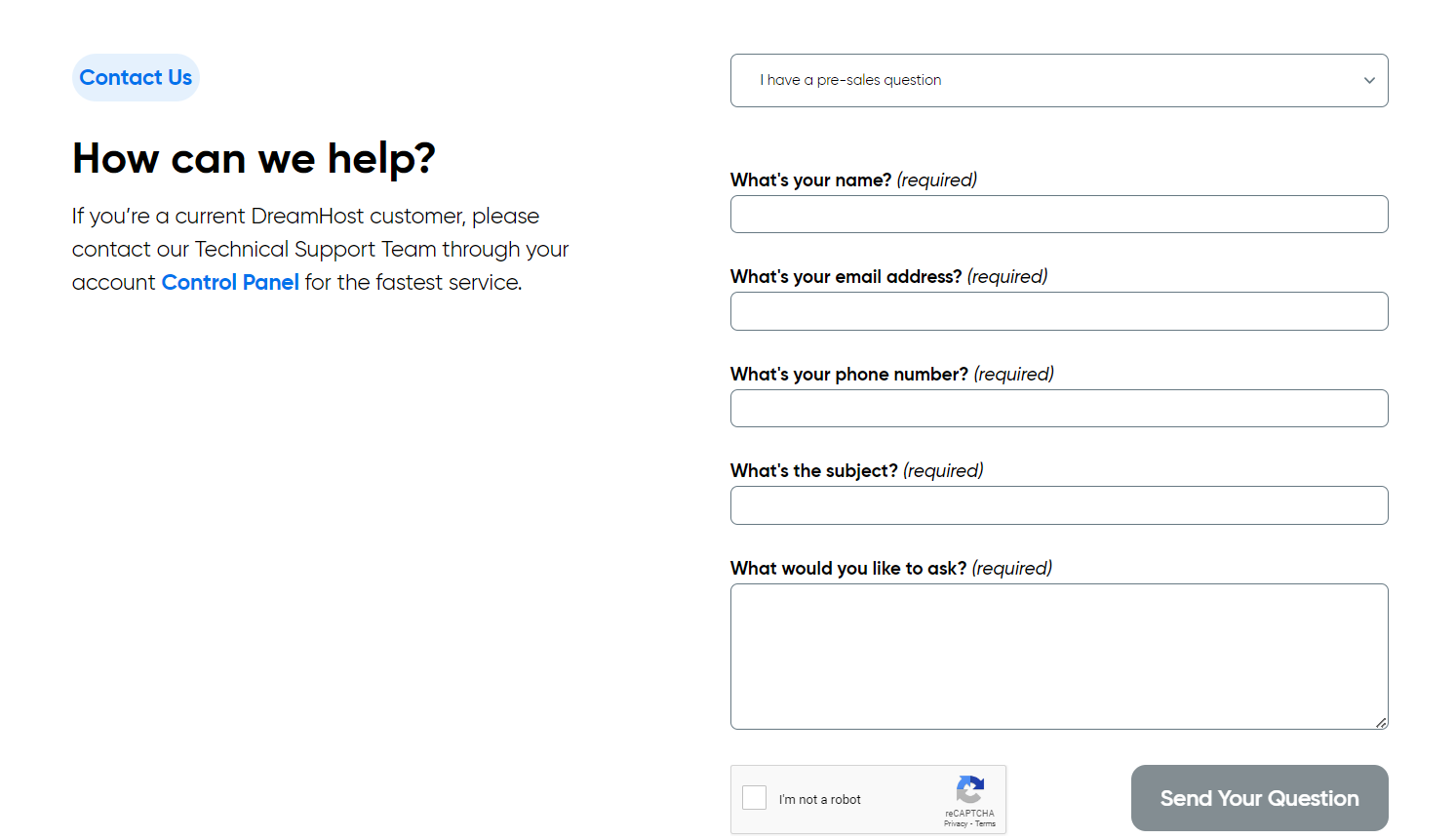
DreamHost excels with a vast knowledge base and offers unique professional services such as custom web design and website management. Their callback service for an additional fee is useful but may not be accessible to all users. On the other hand, HostGator provides promotional offers and has received positive customer testimonials for their service reliability and ease of use. HostGator’s superior score reflects its broad support channels and additional resources, giving it the edge over DreamHost.
User feedback
HostGator offers affordable, user-friendly web hosting services, which are appealing to both beginners and budget-conscious users. Key strengths include competitive pricing, reliable uptime, free SSL certificates, and efficient customer support. However, customers have reported issues such as slow server performance, aggressive upselling, rising renewal prices, and limited advanced features. While the overall experience can be positive, especially for small-scale or low-traffic sites, technical support responsiveness and server speed occasionally fall short, impacting the user experience.
DreamHost is a well-regarded hosting provider praised for its reliability, affordable pricing, user-friendly interface, and excellent performance. Users especially appreciate the responsive customer support, the easy navigation of the web portal, and a variety of hosting options suitable for different needs. However, common criticisms include the lack of phone support, occasional slow response times from customer service, and some challenges related to advanced functionalities and site migrations. While the majority of users report positive experiences, a few have faced significant issues with downtime and customer service, impacting their overall satisfaction.
FAQ
Which platform is better suited for hosting WordPress websites?
Both HostGator and DreamHost are well-suited for hosting WordPress websites, offering pre-installed WordPress and related optimizations. DreamHost stands out with built-in caching and automated backups, while HostGator impresses with features like Cloudflare CDN for improved performance. Ultimately, both platforms are tied in this category, making either a viable option for WordPress hosting.
Which hosting service offers better security features?
HostGator provides a robust selection of security features, including free and paid SSL certificates, SiteLock Security for malware detection, and Cloudflare CDN for DDoS protection. DreamHost also offers solid security measures like free SSL certificates, Multi-Factor Authentication, and DreamShield malware scanning. While both provide essential security features, HostGator’s additional SSL options and comprehensive security integrations give it a slight edge.
Which hosting service offers more scalability options for growing websites?
HostGator and DreamHost both provide scalable solutions that grow with your website’s needs. HostGator allows resource scaling through various plans, although specific details on automatic scaling aren’t provided. DreamHost offers expandable RAM and storage, making seamless upgrades possible. Both providers excel in dedicated server offerings but may require plan upgrades as needs grow, making them both flexible but requiring careful selection based on specific requirements.
Which platform offers better customer support?
Both HostGator and DreamHost offer 24/7 customer support through multiple channels, but HostGator includes phone support while DreamHost lacks it. HostGator provides extensive resources, including a KnowledgeBase, webinars, and YouTube tutorials. DreamHost compensates with a comprehensive ticket system and live chat. HostGator’s broader support channels and additional resources give it an edge in terms of overall customer support.
What are the differences in the control panels offered by each hosting service?
HostGator uses a more traditional control panel (cPanel) designed for ease of use with one-click installs for over 75 open-source scripts. DreamHost offers a custom-built control panel tailored for easy account administration and advanced features like SFTP and Shell Access. HostGator’s cPanel is suitable for beginners and non-technical users, while DreamHost’s custom panel is intuitive but may require a steeper learning curve for advanced users seeking specialized environment features.
The making of this blog
We followed a clear, step-by-step process to write and research this article.









